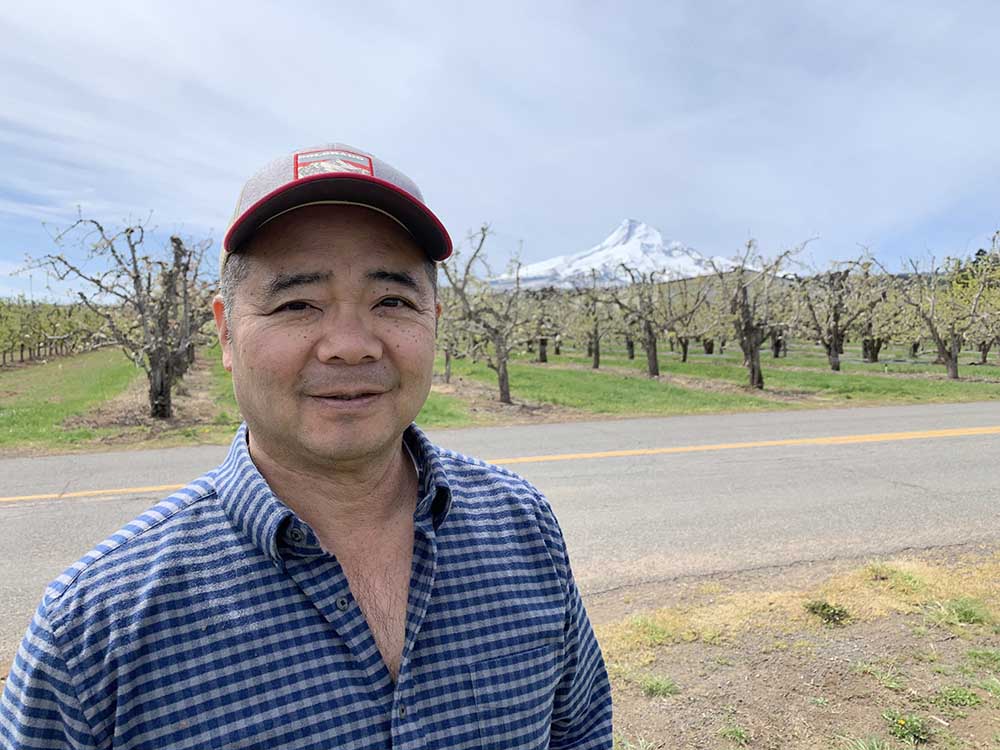Kiyokawa Family Orchards: Hood River Valley farm turns to direct sales
Published 3:30 pm Wednesday, May 1, 2024

- Randy Kiyokawa’s farm has focused more on direct sales and the only fruit he sells to a packing house are pears.
PARKDALE, Ore. — Randy Kiyokawa stood near blossoming pear and apple trees, bees buzzing amid white and pink flowers, and said he used to spend more time in his orchards.
No longer. About 95% of his work now as owner of Kiyokawa Family Orchards is overseeing sales, marketing and financial aspects.
More tree fruit coverage
With massive Washington harvest, apple prices ‘dismal’
Western Innovator: ‘Apple Girl’ reaches 500,000 online followers
Craft distillery in Hood River relies on local fruit, and lots of it
Cherry season officially a disaster in Washington, Oregon
Correa elected chairman of World Apple and Pear Association
That’s because direct sales gradually became the driving force for the 207-acre farm and represent about 75% of revenue on just 25% of production. Commercial prices put such pressure on growers that, for the most part, pears are the only fruit Kiyokawa sells to a packing house.
“They’re not going to be a home run, but you don’t have the swings up and down that apples do, and especially cherries,” Kiyokawa said.
Direct sales, diversification
Kiyokawa Family Orchards has a farm stand, U-pick operation and teams up with other farmers on subscription boxes. The business also operates booths at 15 farmers markets and sells to restaurants, grocery stores, bakeries and schools.
Those duties mean that Kiyokawa is frequently in the Portland area. His wife, Badri Zolfaghari-Azar, owns Salam Restaurant in Hillsboro, and she’s also a customer.
Kiyokawa said he’s diversified about as much as one person could handle. Still, if an employee was excited about making cider or fruit infused donuts, there might be an opportunity, he added.
Like many Hood River Valley farms, pears are the main crop, and Kiyokawa grows more than a dozen each of European and Asian varieties.
The farm also grows 120 varieties of apples, as well as peaches, plums, nectarines and other fruit. Depending on the time of year, Kiyokawa has 20-50 employees, and most have been with the farm over 20 years. Kiyokawa Family Orchards provides free housing and utilities, which is a common practice in the area to retain workers in the competitive labor market.
Family history
Kiyokawa’s grandfather emigrated from Japan in 1905 and started farming in the Hood River Valley in 1911.
His parents, Mamoru and Michiko Kiyokawa, met in an internment camp during World War II. After serving in the U.S. Military Intelligence Service, Mamoru Kiyokawa returned to the Hood River Valley in 1951 with his wife and purchased a 25-acre orchard in Parkdale.
Randy Kiyokawa said his parents raised their five children to be American, so he doesn’t speak Japanese. He took high school Spanish and improved it by taking community college classes to communicate better with workers.
He was a wrestler in his youth and competed at Oregon State University.
He graduated from OSU with a degree in agricultural engineering technology in 1984 and worked at a major tree, shrub and lawn care company. In 1987, with his father dealing with health issues, he returned to Parkdale to help with the farm.
His mother, Michiko Kiyokawa, 100, still lives there, and is a co-owner. Kiyokawa, 62, has three children. His son, Cameron Kiyokawa, who works as a firefighter, wants to return to the farm.
Farming at elevation
Farming isn’t easy, but it has its perks, Kiyokawa said.
“Working with nature, you’re more in tune with what’s going on,” Kiyokawa said. Growers understand the soil, know when it’s going to rain, and care for the land, he added.
The flexibility also is a plus. For much of the year, if Kiyokawa gets his job done, he can volunteer or spend time outdoors. Spring means plenty of tasks. Orchard workers recently finished pruning and switched to grafting, inspecting irrigation systems and checking trees for frost damage at the farm, which sits below Mount Hood.
“There are challenges with growing fruit at 2,000 feet in elevation,” Kiyokawa said.
Some pears and apples thrive in that climate, though. “We grow great Honeycrisp in Parkdale,” Kiyokawa said.
More Orchard, Nuts & Vines






